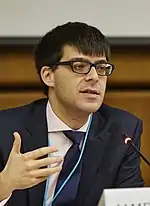James M. Acton
James M. Acton is a British academic and scientist.[1] He is co-director of the Nuclear Policy Program at the Carnegie Endowment for International Peace.[2]

Early life
Acton was awarded his PhD in theoretical physics at Cambridge University.[2]
Career
Acton was a member of the faculty of the Department of War Studies at King's College, London.[1]
Acton's research projects have included analyses of IAEA safeguards in Iran, verifying disarmament in North Korea and preventing novel forms of radiological terrorism.[3]
Fukushima
In the context of the Fukushima I nuclear accidents, Acton was able to distill a succinct analysis which was widely reported.[4]
- "Fukushima is not the worst nuclear accident ever but it is the most complicated and the most dramatic...This was a crisis that played out in real time on TV. Chernobyl did not."[5]
- "The key question is whether we have correctly predicted the risk that a reactor could be hit by a disaster (natural or man-made) that is bigger than it is designed to withstand."[6]
Selected works
In a statistical overview derived from writings by and about James Acton, OCLC/WorldCat encompasses roughly 7 works in 10+ publications in 1 language and 268 library holdings.[7]
- The Use of Voluntary Safeguards to Build Trust in States' Nuclear Programmes: the Case of Iran (2007)
- Beyond the Dirty Bomb: Re-thinking Radiological Terror (2007)
- Abolishing Nuclear Weapons (2008), with George Perkovich
- Abolishing Nuclear Weapons: A Debate (2009), with George Perkovich
- Deterrence During Disarmament: Deep Nuclear Reductions and International Security, and Low Numbers: A Practical Path to Deep Nuclear Reductions (2011)
Notes
- Library of Congress authority file, James M. Acton, no2009-183674
- Carnegie Endowment for International Peace, James M. Acton Archived 14 March 2011 at the Wayback Machine
- "Carnegie Appoints Leading Expert on Nuclear Disarmament and Nonproliferation," Carnegie Endowment press release, 18 November 2008.
- "One Month After Tsunami, What Are Japan's Biggest Needs?" NewsHour (U.S.) 11 April 2011. Archived 12 April 2011 at the Wayback Machine
- "Analysis: A month on, Japan nuclear crisis still scarring," International Business Times (Australia). 9 April 2011, retrieved 2011-04-12. Archived 16 April 2011 at the Wayback Machine
- Owen, Jonathan. "More than one in 10 nuclear power plants at risk from earthquakes," The Independent (UK). 3 April 2011. Archived 4 April 2011 at the Wayback Machine
- WorldCat Identities Archived 30 December 2010 at the Wayback Machine: Acton, James M.